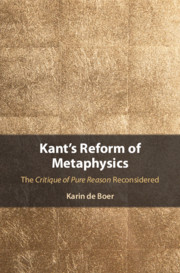Book contents
- Kant’s Reform of Metaphysics
- Kant’s Reform of Metaphysics
- Copyright page
- Contents
- Acknowledgments
- Abbreviations
- Introduction
- Chapter 1 Wolff, Crusius, and Kant
- Chapter 2 The “Thorny Paths of Critique”
- Chapter 3 Ontology, Metaphysics, and Transcendental Philosophy
- Chapter 4 Things in Themselves, Transcendental Objects, and Monads
- Chapter 5 The 1781 Transcendental Deduction of the Pure Concepts of the Understanding
- Chapter 6 The Schematism of the Pure Understanding
- Chapter 7 Transcendental Reflection
- Chapter 8 Kant’s Projected System of Pure Reason
- Conclusion
- Bibliography
- Index of Names
- Index of Subjects
Chapter 4 - Things in Themselves, Transcendental Objects, and Monads
Published online by Cambridge University Press: 20 August 2020
- Kant’s Reform of Metaphysics
- Kant’s Reform of Metaphysics
- Copyright page
- Contents
- Acknowledgments
- Abbreviations
- Introduction
- Chapter 1 Wolff, Crusius, and Kant
- Chapter 2 The “Thorny Paths of Critique”
- Chapter 3 Ontology, Metaphysics, and Transcendental Philosophy
- Chapter 4 Things in Themselves, Transcendental Objects, and Monads
- Chapter 5 The 1781 Transcendental Deduction of the Pure Concepts of the Understanding
- Chapter 6 The Schematism of the Pure Understanding
- Chapter 7 Transcendental Reflection
- Chapter 8 Kant’s Projected System of Pure Reason
- Conclusion
- Bibliography
- Index of Names
- Index of Subjects
Summary
Chapter 4 seeks to resolve the apparent contradictions in Kant's account of the thing in itself and related terms by interpreting the relevant passages in light of his critique of Wolffian metaphysics. The chapter departs from both the two-aspect view defended by Allison and the two-object view that Guyer attributes to Kant. Moving beyond this opposition, the chapter dissociates Kant’s remarks on the objects that affect our senses from his use of the term ‘thing in itself’ and its cognates in the context of his critique of Wolffian and post-Wolffian metaphysics. In the latter context, it is argued, the term refers to things that can be thought but cannot constitute objects of cognition. The chapter shows that Kant’s account of the thing in itself in this sense and, hence, the distinction between phenomena and noumena allows him at once to limit the scope of former ontology to possible objects of experience and to affirm the ideas of the soul, the world as such, and God as noumena that can be thought but not known.
Keywords
- Type
- Chapter
- Information
- Kant's Reform of MetaphysicsThe <I>Critique of Pure Reason</I> Reconsidered, pp. 101 - 126Publisher: Cambridge University PressPrint publication year: 2020

